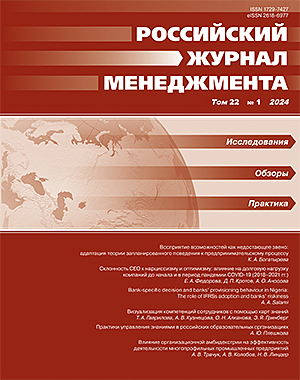Visualization of employees’ competencies using knowledge maps
DOI:
https://doi.org/10.21638/spbu18.2024.104Abstract
Goal: to develop and test an approach to visualize the expert profile of a department of a modern university and its employees. This approach can be extended to the educational organization with additional levels of generalization if necessary.
Metodology: the analysis of the literature on knowledge maps was carried out to determine the logic of knowledge mapping in a modern university through the prism of stakeholders. The empirical study was conducted in the form of a self-assessment questionnaire among employees of a university business school.
Findings: the paper proposes an approach to identify basic ontologies to describe the activities of teachers and researchers in modern educational organizations in general and as part of the empirical study in particular.
Originality and contribution of the authors: the presented approach to identify basic ontologies for the development of visual models allows to systematically represent the professional and practical knowledge and levels of teachers and researchers’ expertise as well as to rise to a higher level of conceptual generalization of large and ultra-large volumes of data, and ease communication gaps between different groups of stakeholders.
Keywords:
knowledge models, ontologies, knowledge maps, data and knowledge visualization, knowledge management
Downloads
References
References in Latin Alphabet
Translation of references in Russian into English
Downloads
Published
How to Cite
Issue
Section
License
Articles of the Russian Management Journal are open access distributed under the terms of the License Agreement with Saint Petersburg State University, which permits to the authors unrestricted distribution and self-archiving free of charge.





